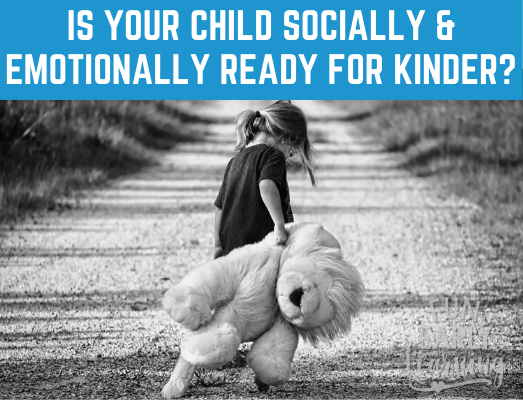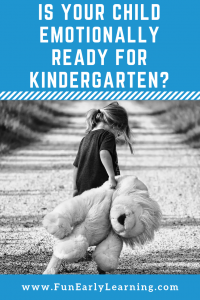
Have you witnessed young children have meltdowns over small things? They begin with the lip pout followed by collapsing on the floor in protest. Children do this because they are still learning to control their feelings and emotions.
There are important social-emotional development skills your child MUST know before kindergarten. Making sure they are ready will help them to be successful from DAY ONE of class. Is your child ready?

Did you miss part 1 of this series? No worries! You can read it here.
What is social-emotional development?
- controlling your own feelings, emotions and behaviors (self-control)
- understanding the feelings of others and express empathy
- cooperating and getting along with adults and peers
- following directions
- showing self-confidence
Identifying letters and numbers is NOT enough for children to know before they enter kindergarten. They need to be excited and curious about learning They also need to be confident in their abilities. These skills will help them to immediately start participating in learning when they start kindergarten.
Is your child socially and emotionally ready for kindergarten?
You may never have thought about this before and that’s okay. We have an entire section focused on Social-Emotional Development in our assessment to help you. It is designed to identify the skills your child is great at. It also identifies areas to further develop before kindergarten. We’re giving away FREE access to our full assessment during this series to our loyal followers.
How to promote and assess social and emotional development
Now that you know what social-emotional development is for preschoolers, let’s talk about what you can do to make sure your child has these skills BEFORE kindergarten. Remember, you will assess you child at the end of this series with our full assessment.
As a parent, you play an important role in your child’s development. You are your child’s first role model and example of how to behave.

Here are some things to do to make sure your child is developing the right skills.
- When your child is talking to you, do they make eye contact? Are they using the proper voice level? Are the speaking clearly or using a whinny tone? These are things to be aware of in your interactions with your child because they are opportunities for you to show positive ways to interact. Be affectionate with your child, show compassion for their feelings and needs, and actively listen by making eye contact and responding to what your child says.
- Does your child get excited and insist to do things on their own? Do they want to put their shoes on their own feet even if they haven’t mastered tying them yet? It is important for children to begin doing tasks independently, even if it is not done perfectly or they need help. Encourage them to dress themselves, brush their teeth, or even do simple chores like dusting.
- Is your child confident? Do they jump right in and do things or are they constantly asking for reassurance? The more you encourage your child and show that you are proud of them, the more confidence they have and the more independent they become.
- When playing with other children does your child share their toys without being told to? Do they cooperate and use teamwork? If their friend gets hurt, does your child feel bad for them? By having your child play with others, they learn to share and take turns with each other. They also learn how to communicate their thoughts, feelings and needs with people their own age.
As you continue to support and encourage your child, they naturally develop the social and emotional skills they need. These skills make the transition into kindergarten easier because your child is ready for SUCCESS. They are also less likely to display behavior problems.
These are just a few of the social and emotional skills children need to develop before kindergarten. We give you the ENTIRE list of skills in our full assessment at the end of this series.
In our next article, we discuss The Top 3 Pre-k Reading Standards Every Child Needs to Know Before Kindergarten. You’ll learn what they are and how to assess them.

